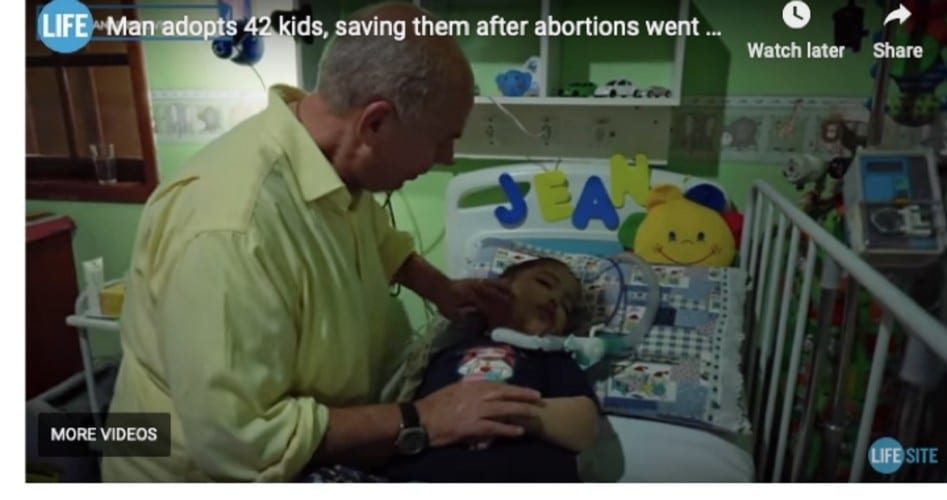
Abortion advocates often claim that pro-lifers are insincere in their expressed concern for children because they don’t adopt enough unwanted kids. Even the most hardcore abortion activist, however, could never employ that canard against Tonio Tavares De Mello (shown), a Brazilian man who, over the last three decades, has adopted 42 disabled children, many of them survivors of botched abortions.
According to LifeSiteNews, in 1990, De Mello, a Roman Catholic, founded a community called Jesus Menino (Baby Jesus) about 50 miles north of Rio de Janeiro “after being shocked by the living conditions suffered by many disabled orphans.” Since then, he has adopted 42 disabled children and opened three communities in Brazil and Portugal to house and educate some 117 disabled adults.
“I do this work because it is a special calling from God,” De Mello told LifeSiteNews. “He has a natural gift for life, and He counts on my ‘Yes’ each day to make life happen. I’m giving my life for many lives.”
Taking care of that many children, especially ones with disabilities, could be overwhelming, but De Mello draws his strength from the one through whom he can “do all things” (Philippians 4:13).
“If it wasn’t for this perfect love of God’s trust in me, I couldn’t do it,” he said. “I can be a full father of 42; it’s because this strength comes from God. It’s not human.”
“De Mello brought several of the adult disabled members of the community [to the Brazilian embassy in Washington, D.C.,] to meet Brazil’s diplomatic representative to the United States,” Ambassador-elect Nestor Forster, Jr., reported LifeSiteNews.
Forster was clearly impressed with De Mello’s commitment to his calling, telling LifeSiteNews, “It’s very deeply touching.”
“Most of the kids he has adopted have been victims of abortion, of abortions that went wrong, botched abortions, et cetera,” Forster said. Echoing De Mello’s description of the Jesus Menino Disabled Community, Forster called it an “embassy of heaven on Earth.”
“It doesn’t get more pro-life than what Tonio does,” he declared.
“The most fundamental aspect of Christianity is the defense of life because of the sacredness of life, because we believe we are created in the image of God, and because God, Jesus Christ, became man and therefore gave us his own sacredness to all human beings, all humanity,” said Forster. “All of them.”
Sadly, disabled people around the world are often treated poorly; children are frequently subject to neglect or abandonment. In many countries that pride themselves on their enlightenment, unborn children who are expected to enter the world with disabilities are almost routinely aborted, as Live Action News reported:
In Iceland, they have “eradicated” Down syndrome, not by helping individuals living with the condition, but by aborting every child conceived and diagnosed with Down syndrome. A study out of Australia found that 94.6 percent of preborn children diagnosed with cystic fibrosis there are aborted.
De Mello’s story is one of several recounted in the upcoming film HumanLife. Produced by Brazilian filmmakers Luiz Henrique Marques and Gustavo Brinholi, HumanLife “features interviews and scenes from the lives of De Mello’s adopted children, a tetraplegic artist, and others,” noted LifeSiteNews. “In a preview of the movie, De Mello said, ‘I have 42 adopted children. I embraced a path in my life that I never thought about.’”
HumanLife is scheduled for release during the 2020 March for Life, a cause that is near and dear to De Mello’s heart.
“To the nations that are trying to implement this procedure [abortion], just don’t do it, because your nations will become broken nations,” De Mello told LifeSiteNews. “A nation that promotes the death of innocent people or disabled people is not a developing nation, but a dead nation.”
Image: Screenshot of YouTube video at lifesitenews.com
Michael Tennant is a freelance writer and regular contributor to The New American.



